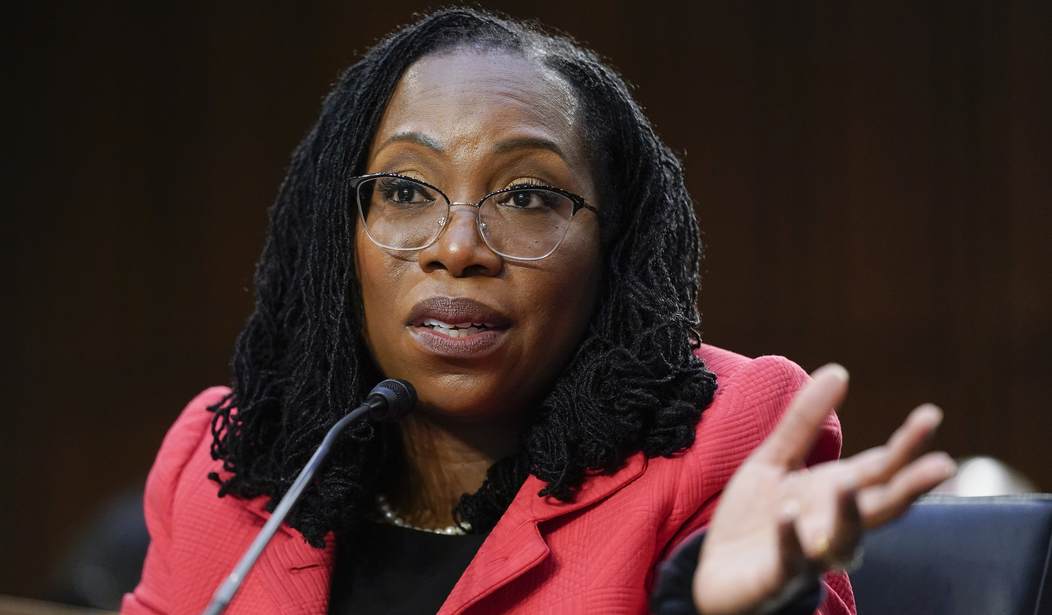Does it ever cross your mind that if more judges and lawyers spent more time working to create a more just legal system than twisting themselves into pretzels looking for loopholes and rationalizing arguments in support of limiting sentences of offenders, what a better, safer country America might be? Mine, too.
The latter is the case with Biden’s controversial Supreme Court nominee Ketanji Brown Jackson, who continues to argue that not all child pornography offenders are pedophiles and therefore, “deserve” lesser sentences — with no required minimums. Just one problem. Her own expert witnesses have disagreed.
As reported by Just the News (JTN), Jackson disagreed with her own expert witnesses about the definition of pedophilia during her time as Vice-Chair of the U.S. Sentencing Commission, according to hearing transcripts.
Republican members of the Senate Judiciary Committee last week blistered Jackson over multiple issues, including her fondness for handing out lenient sentences to child sex offenders, which she attempted to justify by claiming she was only “doing what law students do” — a reference to an essay she wrote which was critical of the treatment of sex offenders, while a student at Harvard Law School.
Let’s review a few of those sentences, per an article I wrote earlier this month. Law school essays aside, this is real-life stuff, much of which shattered real lives:
In the case of United States v. Hawkins, the sex offender had multiple images of child porn. He was over 18. The Sentencing Guidelines called for a sentence of up to 10 years. Judge Jackson sentenced the perpetrator to only 3 months in prison. Three months.
In United States v. Stewart, the criminal possessed thousands of images of child porn and also hoped to travel across state lines to abuse a 9-year-old girl. The Guidelines called for a sentence of 97-121 months. Judge Jackson sentenced the criminal to just 57 months.
In United States v. Cooper, in which the criminal had more than 600 images and videos and posted many on a public blog, the Guidelines called for a sentence of 151-188 months. Judge Jackson settled on 60 months, the lowest possible sentence allowed by law.
In United States v. Downs, the perp posted multiple images to an anonymous instant messaging app, including an image of a child under the age of 5. The Guidelines recommended 70-87 months. Judge Jackson gave him the lowest sentence allowed by law, 60 months
In United States v. Sears, the sex offender distributed more than 102 child porn videos. He also sent lewd pictures of his own 10-year-old daughter. The Guidelines recommended 97-121 months in prison. Judge Jackson gave him 71 months.
As noted by JTN, Jackson, during a February 2012 Sentencing Commission hearing, clashed with a panel of experts over the issue: Gerald Grand, a New York digital forensic investigator, James Fottrell, a U.S. Justice Department expert in criminal child exploitation, and Dr. Gene Abel, the founder of Abel Screening, a medical group that works to identify pedophiles.
Translation: a judicial activist driven by left-wing ideology with zero knowledge of an issue vs. three noted experts in the field. Sounds legit. As with COVID and science, the left’s narrative wins every time.
Jackson is quoted in the hearing transcript as telling the panel.
I was surprised at some testimony with respect to the motivations of offenders, and that there are people who get involved with this kind of activity who may not be pedophiles who may not be necessarily interested really in the child pornography but have other motivations with respect to the use of the technology and the being in the group and, you know, there are lots of reasons perhaps why people might engage in this.
What difference does it make why people get involved in child pornography?
What difference does an offender’s motivation or degree of “interest” have on the trauma of their victims and their families? Jackson’s argument is simply advanced rationalization for the purpose of arriving at a pre-desired objective. She asked the panel:
I’m wondering whether you could say that there is a — that there could be a less-serious child pornography offender who is engaging in the type of conduct in the group experience level because their motivation is the challenge, or to use the technology? They’re very sophisticated technologically, but they aren’t necessarily that interested in the child pornography piece of it?
Again, so much time on mental gymnastics, so little compassion for the most innocent victims of all.
In response, Fottrell said he believed it was “difficult” to say child sex offenders with “only one” illegal encounter are “not dangerous,” according to the transcript. He also said offenders who view child porn online are also exposed to a network of other pedophiles, leading many to become more serious offenders.
Jackson then asked Grant a stupid leading question that blew up in her face:
What factors do you look at to say this person is really serious, as opposed to someone else?
Grant responded that he has not seen “any distinct area that’s going to put that person to the next level” as an offender, and that the number of files downloaded didn’t matter, either.
Abel went bottom line: “Persistent sexual interest over time equals pedophiles.”
After being sufficiently discredited, Jackson again opened her mouth — just to change feet:
I had mistakenly assumed that child pornography offenders are pedophiles. So I’m trying to understand this category of non-pedophiles who obtain child pornography. And are those the people who you are saying are the nonsexually motivated offenders?
Abel responded: “I think you ought to keep your previous definition, quite frankly.”
Game, set, match. Yet here we are:
A left-wing judicial activist with a fixation on forgiving child porn offenders will soon sit on the highest court in the land. Nominated by a pandering president whose two main criteria were gender and skin color, and proudly confirmed by members of a Democrat Party gone mad.















Join the conversation as a VIP Member